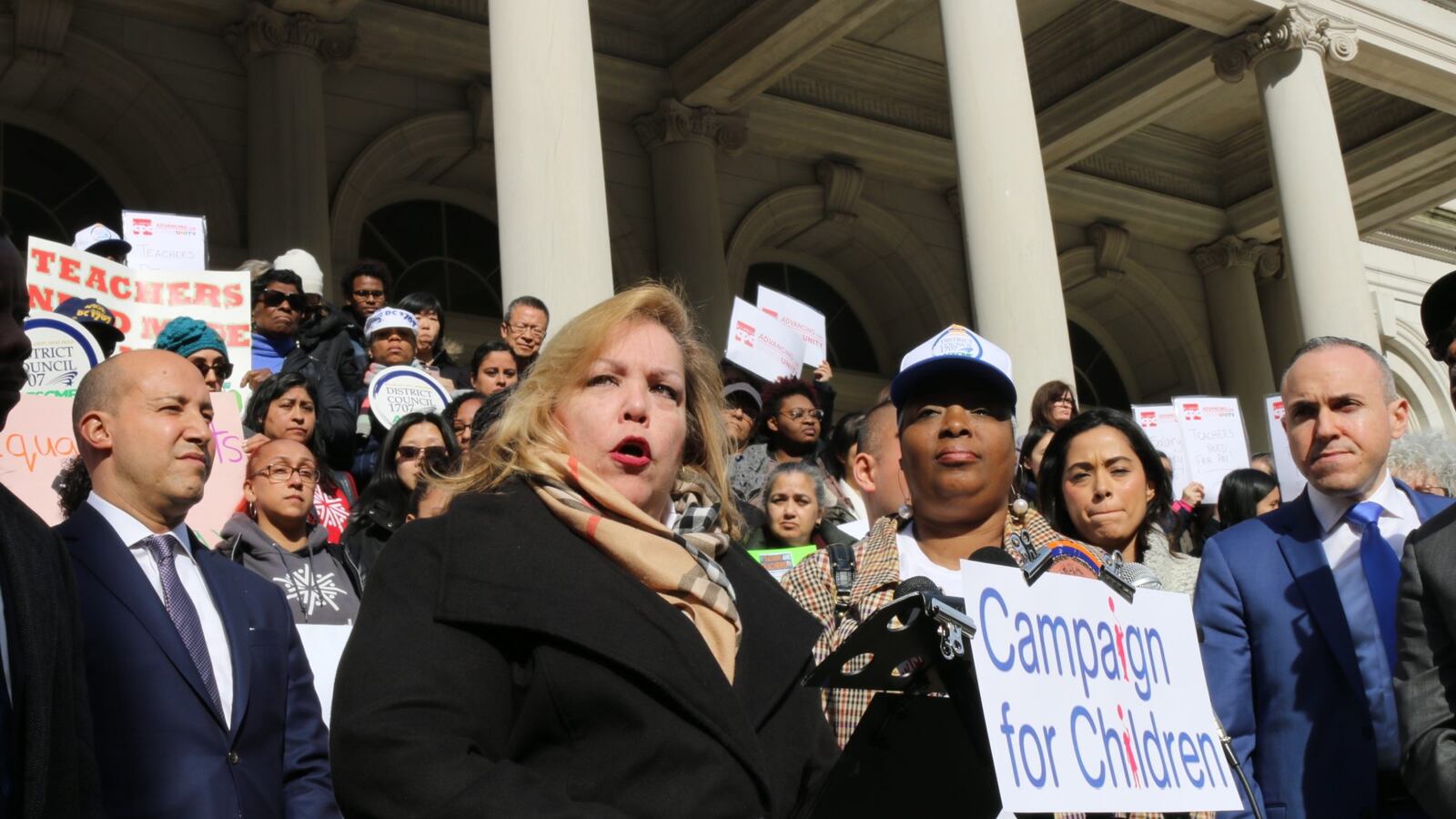Thousands of pre-K teachers in New York City are set to strike on Thursday, but the union representing educators who work in community-run centers stopped short of calling for all of its 7,500 members to walk off the job.
Teachers are expected to rally on Thursday at noon on the steps of City Hall. But the decision to dial back the size of the action raises questions about how many teachers will join and could soften the impact of the union’s action.
Driving the work stoppage is a demand for higher pay. The teachers represented by District Council 1707 work in community-run centers and earn up to 60 percent less than their peers in public school classrooms.
Whatever the size, a strike threatens to tarnish Mayor Bill de Blasio’s signature educational achievement — free, universal pre-K for all of the city’s 4-year-olds — just as he weighs a bid for the White House. While the teachers aren’t city employees, the city holds the purse strings for their pay. That’s because the centers they work in, mostly nonprofits, are largely funded through city contracts.
The pay divide is especially glaring because teachers in community-run centers are often women of color, while the majority of teachers in public schools are white. Ultimately, teachers are required to earn the same credentials regardless of the setting they work in.
“My members understand that this administration only gives lip service to women of color,” union leader Kim Medina said at a recent rally on the steps of City Hall.
Medina had said she hoped to work out the union’s differences with the city to avert a work stoppage. De Blasio suggested a day ago there was “real dialogue happening” and said there was “a good chance” of coming to an agreement.
But on Friday, the union tweeted that its members would strike — if only some of them.
The problem: Some members are covered by a labor agreement that prohibits a work stoppage. That agreement covers most members of Local 205.
The local’s bargaining agreement runs through 2020, but teachers are hoping for a raise now because the city is in the midst of “re-bidding” its early childhood education contracts — and because the mayor and council are currently negotiating next year’s budget. Advocates say it’s the perfect moment to build in extra funding for pay parity.
A union spokesman said DC 1707 had hoped that the Day Care Council of New York would reopen its labor agreement to renegotiate pay. Reopening the contract, the union believes, would afford their members protection from being penalized for walking out.
But the Day Care Council, which represents the boards of nonprofit providers, refused.
“We cannot enable disruption of essential child care services for families and their providers,” Nilesh Patel, an attorney for the council, wrote in an email.
The contract governing Local 95, whose members work in centers funded mostly through federal Head Start dollars, is expired. Those members — who number about 3,000, according to the union — are being encouraged to walk off the job.
A partial strike is surprising, given that members of both locals voted last month to approve a work stoppage. Still, it’s possible many teachers governed by the no-strike clause will leave their classrooms anyways. Many have tacit backing from their employers, who say the salary gap makes it hard to hold onto teachers who could make tens of thousands of dollars more working in city classrooms.
“They’re not necessarily taking a position on the action because it’s an action that’s coming from the workers,” said Gregory Brender, co-director of policy and advocacy at United Neighborhood Houses, which represents childcare providers. “But the goal of salary parity is something that they strongly” support.
Alan van Capelle, head of the nonprofit Educational Alliance, which enrolls hundreds of students in its preschools, recently told Chalkbeat that he plans on paying his teachers for the day they’ll miss while demonstrating.
“I absolutely support the right of our teachers to go out on strike to achieve what I truly believe is rightly theirs,” van Capelle said. “I’m sick and tired of our agency and our talented staff doing the work, and not getting adequately compensated.”
Even non-unionized teachers are planning to join the action.
Alice Mulligan, who runs a pre-K center in Brooklyn where teachers aren’t unionized, has launched a grassroots effort to organize schools like hers. She recently told Chalkbeat that she is encouraging her staff to walk out, and she expects other operators to do the same.
“I really feel like this is our chance,” she said. “This is our moment now, and I think it’s going to require a full, focused effort. And we’re up for the fight.”

